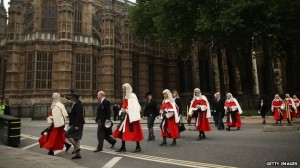Britain lacking in diversity, study finds

Copyright: Getty Images
Britain is a still a class riven society lacking diversity, according to a new study by the UK’s Social Mobility and Child Poverty Commission.
The report says the nation is still “deeply elitist” with private school educated students and Oxford and Cambridge graduates’ domination of top roles in society.
The lack of diversity means that many of Britain’s key institutions are not representative of the public they serve, the commission said.
The study analysed more than 4000 people in top jobs and concluded that elitism is alive and well in the UK.
“Britain’s elite has been formed on the playing fields of the independent schools and finished off in Oxbridge’s dreaming spires,” the report said.
It found more than 70 per cent of senior judges, more than 60 per cent of senior military officers and more than half of senior public servants attended a private, fee-paying school.
It also found more than half of senior diplomats, 45 per cent of public body chairs, 44 per cent of the Sunday Times Rich List entries, 43 per cent of newspaper columnists and 26 per cent of BBC executives attended a private school.
Half of the House of Lords also attended a private school, the report said.
It pointed out that only sixteen per cent of the British population attended a private school.
The data also reveals the numbers in each profession who studied at Oxford or Cambridge. The most over-represented profession was the judiciary.
“Our examination of who gets the top jobs in Britain today found elitism so stark that it could be called social engineering,” the report said.
“Our research shows it is entirely possible for politicians to rely on advisers to advise, civil servants to devise policy solutions and journalists to report on their actions having all studied the same courses at the same universities,” it said.
“This risks narrowing the conduct of public life to a small few, who are very familiar with each other but far less familiar with the day-to-day challenges facing ordinary people in the country.”












